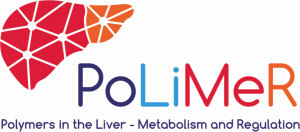Projects
Running Projects
| ERC Advanced Grants 2021 – Beyond stress Project number 101054429 |
| DFG: Development of a miniaturized analytical platform for quantitative, time-resolved, high-throughput analysis of signaling network kinetics in cancer cells. Project partner. Joint project with Jürgen Rühe (IMTEK Freiburg University, DE). Project No 290023083 (TH 1358/3-2) |
| EU HORIZON-HLTH-ENVHLTH – European Partnership for the Assessment of Risks from Chemicals PARC WP5.2 & 5.3: Endocrine disruption. COFUND action. Project No 101057014 |
| H2020 SwafS-08-2019-2020 VERSA – Video gamEs foR Skills training. Project number 101006420 |
| H2020-MSCA-COFUND-2018 ARDRE – Ageing, Regeneration, and Drug Re-search* K. Thedieck is co-coordinator. Marie Skłodowska-Curie grant agreement No 847681 |
| H2020 ITN PoLiMeR – Polimers in the Liver – Metabolism and Regulation K. Thedieck is WP leader. Marie Skłodowska-Curie grant agreement No 812616 |
| Deutsche TS Stiftung e.V. – Metabolic profiling of TS patients with epilepsy K. Thedieck is coordinator. |
| H2020 SC1-PM-02-2017 MESI-STRAT Systems Medicine of Metabolic-Signaling networks: A New Concept for Breast Cancer Patient Stratification K. Thedieck is coordinator. Grant agreement No 754688 |
| Stichting TSC Fonds – Exploring Metabolic Changes with Potential Treatment Implications in TSC Patients: A Multicenter Pilot Study Collaborative project with D. Mekahli, MD, PhD, University Hospital Leuven, BE. |
Past Projects
SYSTEMS MEDICINE OF METABOLIC-SIGNALING NETWORKS
– A New Concept for Breast Cancer Patient Stratification –
MESI-STRAT is a 57 months project coordinated by Prof. Kathrin Thedieck. Dr. Tobias Anzeneder from the German patient organization PATH Biobank is the MESI-STRAT co-coordinator.
Breast cancer (BC) is a complex disease with high prevalence in the European Union and world-wide. 75-80% of the patients have estrogen receptor-positive (ER)-positive tumors and are treated with endocrine therapies. Endocrine therapies, which block ER-driven tumor growth, show high efficacy. Yet, a significant proportion of the patients will eventually relapse with metastatic breast cancer, and the recurrence rates remain almost constant for up to 20 years.
The MESI-STRAT consortium, which consists of 14 partners from seven European countries, will develop new models for knowledge-based stratification of patients into subgroups with different ET resistance mechanisms.
- MESI-STRAT will establish predictive pipelines for:
- patient stratification prior and during endocrine therapy
- recurrence risk assessment when ending endocrine therapy
- marker panels to guide established targeted therapies for endocrine therapy-resistant patients
- novel ET resistance mechanism-based therapy design
The unique collection of matched BC tissue, serum, and >10 years follow-up from the patient organization PATH is essential for the longitudinal analysis of ET resistance and relapse. Our team of oncologists, modelers, bioinformaticians and experimentalists will develop new computational models in combination with network analyses and pharmacogenomics, to integrate multi-omics data and explore metabolic and signaling (MESI) networks driving ET resistance. Metabolite marker panels measured in biological fluids will enable patient stratification, resistance monitoring and clinical decision-making. This is a new concept as BC metabolism is poorly explored for diagnostics and therapy. Upon successful validation in preclinical models, the predictive marker panels and related treatments will be jointly investigated by our clinical and industrial partners in clinical studies.
For further information click here.
Funded by

This project has received funding from the European Union’s Horizon 2020 research and innovation programme under grant agreement No 754688.

Metabolic diseases are a burden on the European population and health care system. A Systems Medicine approach, based on computational models fed with individual patient data, has the potential to provide the basis for a personalized diagnosis and treatment strategy. The PoLiMeR consortium (Polymers in the Liver: Metabolism and Regulation) has identified the inherited, liver-related diseases of glycogen and lipid metabolism as the ideal starting point for innovative research training in personalized ‘Systems Medicine’. These diseases are life-threatening for children. Since each specific disease is rare, research efforts are diluted. Our system-based perspective opens possibilities for the application of novel drugs and diagnostic tools to a range of different diseases. PoLiMeR is funded through the EU Marie Skłodowska-Curie Innovative Training Network (ITN), which drives scientific excellence and innovation. Our ITN brings together universities, research institutes, industry and clinical partners from across the world to train researchers to doctorate level. Our lab partners the PoLiMeR consortium and focuses on the role of autophagy and mTOR signaling in inborn errors of glycogen metabolism.
For further information click here.
Funded by

Development of a miniaturized analysis platform for quantitative and time-resolved high throughput-analysis of AKT-mTOR signaling kinetics in cancer cells
Protein kinase networks such as the mammalian target of rapamycin (mTOR) network control virtually all metabolic processes, and are recognized as central determinants and drug targets for neurodegenerative, metabolic and tumor disorders. Systems biology uses dynamic, data driven computational models to simulate and analyze signaling network kinetics and to unravel their complex dysregulation in disease processes such as tumor growth. Ultimately, systems approaches aim at individualized and targeted drug interventions. Yet, the currently available methods which are pursued to obtain parameterization data for computational models, are strongly limited concerning their accuracy: the detection of kinase phosphorylations by immunoblotting and ELISA offers comparably low sensitivity and dynamic range, with high variance, low throughput and the requirement for high volumes of samples and reagents. This restricts the number of time points and replicates to be analyzed and thus limits data accuracy. In addition, measurement of clinical samples is often unfeasible, as they are available only in minute amounts. Using the mTOR network as an example, the present project aims to develop a high throughput method to quantitatively measure phosphorylation kinetics by plug-based immunoassays at nanoliter scale. The here developed high throughput microfluidic platform will open new perspectives to systems biology in that computer models can be parameterized and validated with a higher density of measurements across a kinetic curve with more biological and technical replicates. This will increase the speed, accuracy and statistical power of model parameterization and analyses.
This project is performed in collaboration with
IMTEK – Department of Microsystems Engineering, University of Freiburg, Germany (Prof. Dr. Rühe, Dr. Brandstetter, Lukas Metzler)
Funded by
![]()
MAPK-mTOR network model driven individualized therapies of pancreatic neuro-endocrine tumors (pNETs)
Pancreatic NET (pNET) comprise the most prominent subgroup group of rare Neuroendocrine tumors (NET) with distinct prognostic classes, and thus diverse therapeutic regimens. Available pNET treatments include somatostatin analogs, systemic chemotherapy, and novel molecular drugs targeting receptor tyrosine kinases (Sunitinib), or the mTOR pathway (Everolimus). However, tumor heterogeneity results in an unpredictable response to the therapy, and only a limited number of patients profits from either treatment. To date, no method for diagnostic stratification of patients exists. The MAPTor-NET consortium adopts a focused systems medicine approach that uses clinical and pathological data together with mutation/expression profiles to individually preselect patients prior to therapy. The approach uses a combination of top-down modeling of the core pathways altered in pNET, and a bottom-up approach gathering and integrating individual molecular data. For patient-specific model setup and parameterization, genetically manipulated experimental systems, closely reflecting the observed clinical situation, are employed. The effects of therapeutic interferences will be measured under different mutational, patient/tumor specific conditions. These data will serve as a basis for primary and improved mathematical modeling of the underlying signaling network. Thus, MAPTor-NET will test and improve the predictive power of dynamic computational models by accounting for the patient-specific genetic background. Initially focusing on pNETs, the MAPTor-NET strategy can be extended to many further tumor entities as they are driven by similar pathway alterations.
In MAPTor-NET we collaborate with
the Charité – Universitätsmedizin Berlin and the Humboldt-Universität zu Berlin, Germany.
For further information click here.
Funded by
Comparison of central metabolic routes and signaling pathways in IDH mutant and wildtype gliomas (WHO °II-IV)

Malignant gliomas belong to the most feared types of cancer, due to their dismal prognosis, as well as direct consequences on cognitive function and quality of life. The mutation of isocitrate dehydrogenase (IDHmut) is of high prognostic relevance in malignant glioma. The IDH status has been connected with altered tryptophan (Trp) metabolism but the mechanism is unknown. Trp is intertwined with central cancer metabolism (nicotinamide adenine dinucleotide, NAD) and signaling pathways (mammalian target of rapamycin, mTOR; aryl hydrocarbon receptor, AHR), but their dynamic interplay and specific impact on drug responses remains elusive. A systems medicine approach integrating these central metabolic and signaling routes with clinical outcomes is currently missing. GlioPATH is an interdisciplinary (biomedical, theoretical, clinical) and synergistic team effort. Iterative computational-experimental approaches will establish the IDH-Trp-NAD-AHR- mTOR network structure and dynamics by integrating several existing data layers (transcriptomics, proteomics, epigenetic, clinical) from TCGA database with metabolomic and kinetic biochemical analyses of glioma tissues. GlioPATH will enable an improved understanding of gliomagenesis and provide the basis to identify possible combinatorial intervention strategies for individualized glioma therapy. GlioPATH will also allow us to establish an innovative scientific network by fostering horizontal knowledge transfer within our network and with the systems medicine community.
In GlioPATH we collaborate with
the University of Jena, the Helmholtz Centre for Environmental Research (UFZ) in Leipzig, and the German Centre for Cancer Research (DKFZ) in Heidelberg.
For further information click here.
Funded by
Tuberous sclerosis (TSC) is a genetic disease which is characterized by high mTOR activity. Therefore, the patients suffer from childhood on from tumors in multiple organ systems, including the brain. mTOR inhibitors have been approved for the treatment of TSC brain tumors. Even though tumor growth is reduced, the therapy does not cure the patients as the tumors grow back when the treatment stops. Using in silico computational models, we test in this project combinatorial metabolic interventions to promote the clearance of TSC tumors.
Funded by



